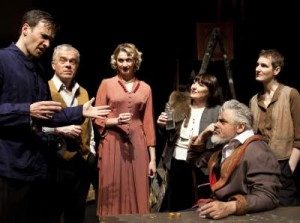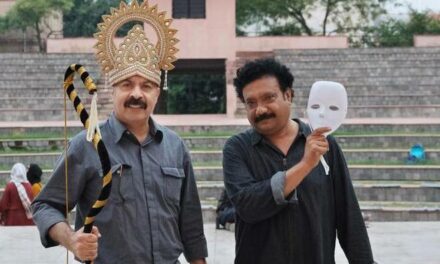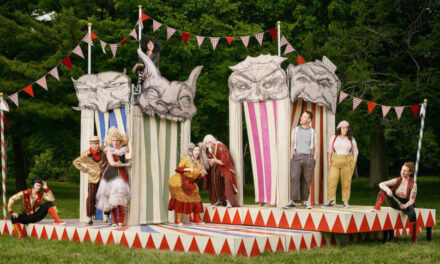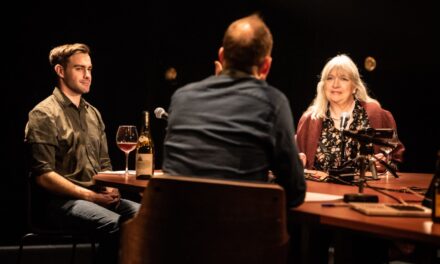David Schneider is probably most recognizable as BBC commissioning editor Tony Hayers in I’m Alan Partridge, cruelly denying Alan Partridge his second series and being invited, somewhat rudely, to smell Partridge’s cheese. Although most famous for his comedy writing and performing, Schneider is also a playwright. Making Stalin Laughs his second play and was commissioned by JW3, a beautifully-designed Jewish community center on Finchley Road (well worth a visit).
Making Stalin Laugh is based on the story of the Moscow State Yiddish Theatre, shut down by Stalin in 1948 after he had ordered the assassination of its director. The plot centers on the company’s highly charismatic director and actor, Solomon Mikhoels. Mikhoels was the company’s leading actor and was famous for several roles – particularly King Lear – which he performed in Yiddish. He was also at one point in favour with Stalin and was appointed Chairman of the Anti-Fascist Committee when his support was useful to Stalin during the war.
In Solomon Mikhoels (Darrel D’Silva), we are presented with the archetypal theatre director/ actor. Egotistical, arrogant, passionate, promiscuous, Schneider’s Mikhoels is a man to be loved and loathed in equal measure. Although the company bonhomie feels somewhat forced at the start of the play, Darrell D’Silva’s spirited performance manages to convince that here is a man both monstrous and inspirational. It is of course hugely ironic that Mikhoels possesses the qualities necessary for any successful dictator. Mikhoel’s performance of King Lear was by all accounts legendary and there is a powerful moment when he is rehearsing the interrogation of Gloucester by Cornwall (Act 3 Sc 7), as Party officials look on. Although the set-up is rather clumsy, the danger that Mikhoels is putting both himself and his company in by appearing to criticise the regime is clearly highlighted, reminding us of the potency and thereby the danger of theatre.
There are some great one-liners and gags in this play which revealed Schneider’s gift for comedy writing. He also appears to understand the unique dynamic of a theatre company: freewheeling promiscuity, competing egos, unrequited love. What the play conveys most successfully is the frightening volatility of an autocratic regime. Policies change with lightning speed, no decision can be made without the approval of the Party, friends become informers overnight, informers themselves live in a state of permanent fear. Nowhere is safe to talk and people simply disappear. Mikhoels sums up Russia’s plight, commenting dryly: “It’s a barroom brawl. You can only survive it if you stand still.”
The director Matthew Lloyd maintains a swift pace although the frequent moving of furniture is rather fussy and intrusive. There were moments where the action lurched uncomfortably into melodrama which was a pity as it distanced the audience. The ending of the play would benefit from a reconsideration of staging. I’m not sure we really needed to hear guns being prepared and cocked to know that the members of the company are about to be executed; it seemed gratuitous. The decision to have empty bottles and plates was also problematic. Why go to the trouble of sourcing period costume and props when the wine and vodka bottles remain unfilled? It was hard not to laugh when Mikhoels tucked greedily into an empty bowl of invisible dumplings.
The most convincing moments came in Act Two. Nina (played with tremendous sincerity and generosity by Sandy McDade) finally permits herself to give the performance of her life, having previously suppressed her extraordinary talent in order to let Mikhoels shine on stage. Another terrific moment is when Mikhoels confronts Isaac, a Party official. When Isaac declares Meyerhold’s 1940 assassination necessary because he and his ilk were “enemies of the people,” D’Silva responds in magnificent form, grabbing Isaac by the lapels and screaming “They were the fucking people!” The brutality of Stalinist Russia is most effectively conveyed in the simple presentation of fact. Meyerhold’s wife Zinaida Reich was, we are informed, stabbed seventeen times, including through her eyes.

David Schneider
Making Stalin Laugh has its flaws. Several of Schneider’s characters veer dangerously towards caricature and only Sandy McDade invests her role with any real complexity or nuance. However, it is undoubtedly an important work and how refreshing to see a play unencumbered by staccato dialogue or a conceit-heavy premise. It resonates strongly, exploring as it does the tension between free speech/ artistic freedom and state intervention. Given the recent imprisonment of three al-Jazeera journalists for ‘spreading false news‘, Making Stalin Laugh is more relevant and necessary than any other play currently in London.
It seems oddly fitting that Solomon Mikhoels was assassinated in Belarus, a country which gave birth to the Belarus Free Theatre. The BFT is living proof that theatre is still a dangerous occupation in some countries, yet its existence is inspirational, displaying courage and resilience in the face of oppression and intimidation. Perhaps Mikhoels’ spirit lives on after all…
This article originally appeared in Central and Eastern European London Review on June 25th, 2014 and has been reposted with permission.
This post was written by the author in their personal capacity.The opinions expressed in this article are the author’s own and do not reflect the view of The Theatre Times, their staff or collaborators.
This post was written by Robin Ashenden.
The views expressed here belong to the author and do not necessarily reflect our views and opinions.


















